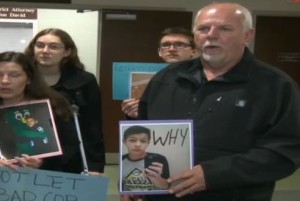For Police, Murder is a Time-Saving DeviceWilliam Norman GriggJan. 07, 2014 |
Popular 
Ben Shapiro, Mark Levin and Laura Loomer Warn of Foreign Influence... From Qatar

NYT: Trump Ended War With Houthis After They Shot Down U.S. Drones, Nearly Hit Fighter Jets

Trump Advisor to Washington Post: 'In MAGA, We Are Not Bibi Fans'

Eloy Adrian Camarillo, 17, Arrested in Shooting Death of Infowars Reporter Jamie White

Trump Cut Off Contact With Netanyahu Over 'Manipulation' Concerns, Israeli Reporter Claims
  "We don't have time for this!" exclaimed a police officer as he shot and killed a psychologically troubled, 90-pound teenage boy who had already been tasered and was pinned down beneath two other officers. The victim, 18-year-old Keith Vidal, was "armed" with a screwdriver at the time of his death. "We don't have time for this!" exclaimed a police officer as he shot and killed a psychologically troubled, 90-pound teenage boy who had already been tasered and was pinned down beneath two other officers. The victim, 18-year-old Keith Vidal, was "armed" with a screwdriver at the time of his death.Vidal's father, Mark Wilsey, had called the police for help when the boy suffered what was described as a psychotic episode on the afternoon of January 5. When the police arrived at the family's home in Boiling Spring Lakes, North Carolina, they rendered the kind of "help" for which they have become so notorious -- repeatedly tasering the troubled young man until one of them simply shot him as a time-saving measure. "There was no reason to shoot this kid," Wilsey told the local NBC affiliate. "We called for help and they killed my son." During a press conference today (January 6), Wilsey recalled that he was helping the police try to calm down his son when one of the officers fired the fatal gunshot. In addition to killing Vidal, the officer imperiled the lives of several other people -- including two of his comrades at risk. He later pointed his gun at Wilsey when the father reacted with predictable pain and outrage over the murder of his son. There was "no reason" for deadly force, Wilsey points out. "They had Tasers on them, and they didn't have to even tase him, they could have just talked to him, talked to him another ten minutes." Speaking during the press conference, Vidal's mother urged parents of emotionally troubled children not to place the lives of their loved ones at risk by inviting the intervention of armed strangers clothed in the supposed authority to kill: "Do not call the police department for help -- because your son will probably be killed, like mine was." This is not the first documented instance in which a police officer has murdered somebody simply because he was in a hurry. During a 2009 incident in a restaurant parking lot, Everett, Washington Police Officer Troy Meade shot and killed Niles Meservey, an intoxicated man whose Corvette had been boxed in by three cars and a chain-link fence. For about a half-hour, Meade attempted to get Meservey to leave the car. After a taser was used on the 51-year-old man, the driver started his car, which lurched forward into the fence. Although Meservey was able to inflict property damage, he was no threat to anyone. But his intractable non-compliance infuriated Meade to the point of murderous rage. "Time to end this -- enough is enough!" bellowed Meade as he pulled the trigger seven times. Those words were heard by a fellow officer, Steve Klocker, who repeated them in sworn courtroom testimony. Klocker's defiance of the "Blue Wall of Silence" prompted the political clique afflicting Everett to attempt undermining Klocker's reliability as a witness -- something it wouldn't have done if the officer had been testifying against a Mundane. Meade was indicted for second-degree murderer and first-degree manslaughter. The jury that heard the case dismissed the officer's self-defense claim, which means that the killing was unlawful. Despite the fact that there was no significant material dispute regarding the details of the incident, the jury also acquitted the killer on both counts, owing to the fact that at the time of the killing he was swaddled in a costume that confers the right to kill, and immunizes its wearer against legal liability for criminal actions. Meade was set free to resume his career as a dispenser of violence on behalf of the State. The murder of Niles Meservey, like that of Keith Vidal, began with a helpful phone call from someone concerned about a person not fully in control of his faculties, either because of intoxication or an emotional disturbance. If you believe the best way to help people in such a condition is to kill them, by all means, call the police. |



